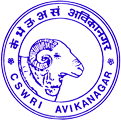
The New York State College of Veterinary Medicine at Cornell University is a college of veterinary medicine at Cornell University, Ithaca, New York. Founded in 1894, it is the first statutory college established by the State University of New York (SUNY) system.

Cochin University of Science and Technology (CUSAT) is a state government-owned autonomous university in Kochi, Kerala, India. It was founded in 1971 and has three campuses: two in Kochi and one in Kuttanad, Alappuzha, 66 km (41 mi) inland. The university awards degrees in engineering and science at the undergraduate, postgraduate and doctoral levels.

Sree Chitra Tirunal Institute for Medical Sciences & Technology (SCTIMST), Trivandrum, is an Institution of National Importance established by an Act of Parliament in 1980. It is under the aegis of Department of Science and Technology, Government of India, with an Institute Body and a Governing Body constituted as per the provisions of the Sree Chitra Tirunal Institute for Medical Sciences & Technology, Trivandrum, Act, 1980. The Institute presents a unique model by connecting the different strands of Biomedical Technology ,Clinical Medicine and Public Health to produce a seamless continuum of indisputable relevance to society.

The Indian Council of Medical Research (ICMR), the apex body in India for the formulation, coordination and promotion of biomedical research, is one of the oldest and largest medical research bodies in the world.

Riseholme College is a Further and Higher Education college in Lincolnshire, specialising in land-based subjects such as Agriculture, Equine and Animal Management.

The Regional Cancer Centre (RCC) at Thiruvananthapuram is a cancer care hospital and research centre. RCC was established in 1981 by the Government of Kerala and the Government of India. It is located in the Thiruvananthapuram Medical College campus in Thiruvananthapuram, the capital city of the state of Kerala. It was established as an expansion of the Radiation Therapy / Radiotherapy department of Medical College Trivandrum. It is a tertiary care center for the managements of all types of cancers. The clinics are mainly on Haematology, Lymphoreticular, soft tissue, bone, head and neck, breast, CNS, gynaecological, urinary, chest, gastro, paediatric oncology and thyroid.

Chaudhary Charan Singh Haryana Agricultural University is a public funded agricultural university located at Hisar in the Indian state of Haryana. It is the biggest agricultural university in Asia. The university has 8,645 acres (3,499 ha) of land. It is named after India's fifth Prime Minister, Chaudhary Charan Singh.

The Government Medical College, Thiruvananthapuram is in Thiruvananthapuram, India. Founded in 1951, it was inaugurated by Prime Minister Jawaharlal Nehru and is Kerala's first ever Medical College.
University of Gezira, or U of G, is a public university located in Wad Medani, Sudan. It is a member of the Federation of the Universities of the Islamic World.
The National Institute of Virology in Pune, India is an Indian virology research institute and part of the Indian Council of Medical Research (ICMR). It was previously known as 'Virus Research Centre' and was founded in collaboration with the Rockefeller Foundation. It has been designated as a WHO H5 reference laboratory for SE Asia region.
The Animal Health Trust (AHT) was a large national independent charity in the United Kingdom, employing over 200 scientists, vets and support workers. Its objectives were to study and to cure diseases in companion animals, and to advance the teaching and practice of veterinary art and science. It was founded in 1942 by Dr WR Wooldridge CBE, FRCVS, and was awarded a Royal Charter on 29 July 1963. The Queen was the charity's patron from 1959 until the end of 2016, and the Princess Royal was its president. Based in Newmarket in Suffolk, it was a registered charity under English law and received no government funding. Following fundraising issues exacerbated by the Coronavirus pandemic, the charity was forced to close its doors and enter liquidation on 31 July 2020.
The Faculty of Veterinary Science is a faculty of the University of Pretoria. Founded in 1920, it is the second oldest veterinary faculty in Africa. With the exception of the faculties in Khartoum, and Cairo, all the other African faculties were established after 1960. It is the only one of its kind in South Africa and is one of 33 veterinary faculties in Africa.

The Indian Institute of Spices Research (IISR) is an autonomous organization engaged in agricultural research related to spices in India. The institute has its headquarters in Moozhikkal, Silver Hills, Kozhikode, Kerala and is a subsidiary of Indian Council of Agricultural Research (ICAR), New Delhi, under the Ministry of Agriculture, India.

The Indian Institute of Horticultural Research (IIHR) is an autonomous organization acting as a nodal agency for basic, strategic, anticipatory and applied research on various aspects of horticulture such as fruits, vegetable, ornamental, medicinal and aromatic plants and mushrooms in India. The institute has its headquarters in Bengaluru, Karnataka, India and is a subsidiary of Indian Council of Agricultural Research (ICAR), New Delhi, under the Ministry of Agriculture, India. It recently has been ranked 1st for the combined years 2019-20 and 2020-21 by the ICAR.

The ICAR-Central Sheep and Wool Research Institute (ICAR-CSWRI) is an Indian Council of Agricultural Research subsidiary commissioned for research, training and extension activities related to sheep and rabbits. The institute is an autonomous body and is sponsored by the Department of Agricultural Research and Education (DARE), Ministry of Agriculture, Government of India. It is situated in Avikanagar, Malpura, in Rajasthan, India. It works in close liaison with the other ICAR institutes, Central Wool Development Board, Sheep and Wool Marketing Federation, Department of Biotechnology (GOI), Small Entrepreneurs, NGOs, State Animal Husbandry and Khadi gram and Cottage industries.
The Central Soil Salinity Research Institute is an autonomous institute of higher learning, established under the umbrella of Indian Council of Agricultural Research (ICAR) by the Ministry of Agriculture, Government of India for advanced research in the field of soil sciences. The institute is located on Kachawa Road in Karnal, in the state of Haryana, 125 km (78 mi) from the Indian capital of New Delhi.
Vallabhbhai Patel Chest Institute is a postgraduate medical institute located in New Delhi, India, and supported by the University of Delhi. The Ministry of Health & Family Welfare of India takes care of its endowment. It has been categorized as one of the constituent colleges of the University of Delhi. The institute's teaching focuses on chest diseases as well as their treatment. The institute is maintained under the statute XX(2) of the University.
Central Institute for Research on Buffaloes, Hisar, a publicly funded, institute for water buffalo research. It is located 170 kilometres (110 mi) from Delhi, at Hisar in the north Indian state of Haryana. It has a sub-campus, Bir Dosanjh, at Nabha. CIRB operates a nationwide network of 10 research centres working on breed improvement of the 7 main native breeds. CIRB, with over 20 laboratories for buffalo research, is the world's largest buffalo research institute with the widest range of breeds under study. With the aim of improving breeds and dissemination of information, CIRB has sold over 1,000 bulls, conducted ~200,000 artificial insemination in the field for the farmers' buffaloes with a 41% conception rate, distributed ~520,000 progeny tested frozen semen kits to 45,000 farmers and over 250 institutes, imparted training to several thousand farmers on advanced buffalo husbandry, and created the world's first online Buffalopedia in several languages. It has a large research partner network across India and the globe. It is the second institute to successfully clone a buffalo in 2016, after the first successful cloning was achieved by the National Dairy Research Institute, Karnal in 2010. In July 2017, the Indian Council of Agricultural Research ranked CIRB Hisar as India's number one Buffalo research institute for the year 2016–17.
A Foreign animal disease (FAD) is an animal disease or pest, whether terrestrial or aquatic, not known to exist in the United States or its territories. When these diseases can significantly affect human health or animal production and when there is significant economic cost for disease control and eradication efforts, they are considered a threat to the United States. Another term gaining preference to be used is Transboundary Animal Disease (TAD), which is defined as those epidemic diseases which are highly contagious or transmissible and have the potential for very rapid spread, irrespective of national borders, causing serious socio-economic and possibly public health consequences. An Emerging Animal Disease "may be defined as any terrestrial animal, aquatic animal, or zoonotic disease not yet known or characterized, or any known or characterized terrestrial animal or aquatic animal disease in the United States or its territories that changes or mutates in pathogenicity, communicability, or zoonotic potential to become a threat to terrestrial animals, aquatic animals, or humans."












